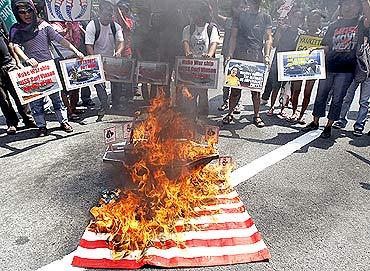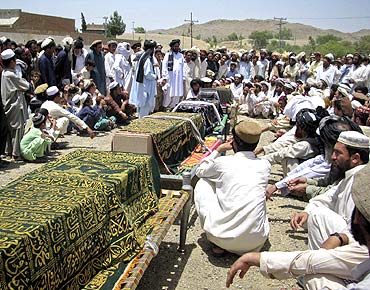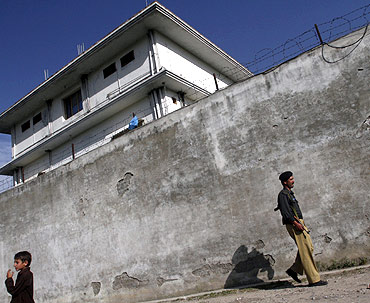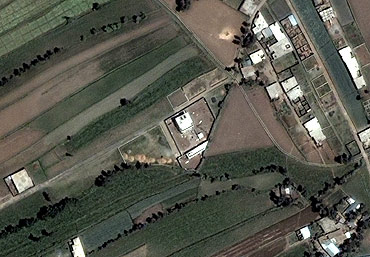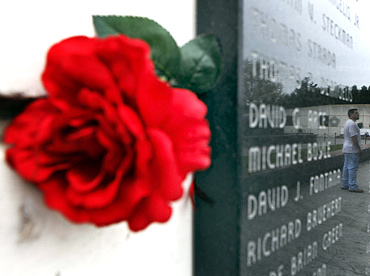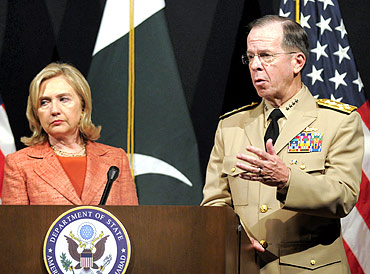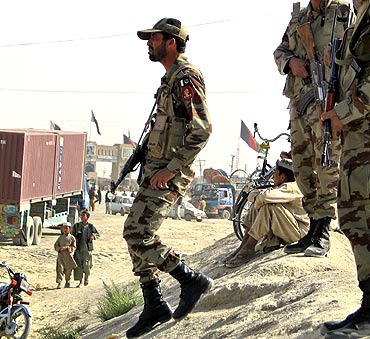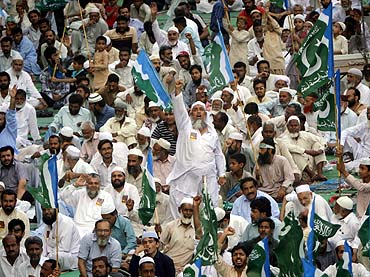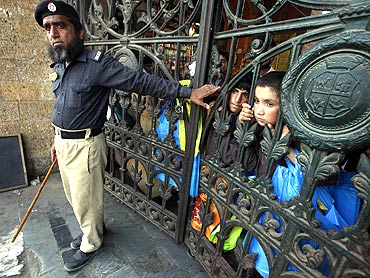 | « Back to article | Print this article |
REVEALED: Secret spy games between US, Pakistan
Amir Mir unravels the complicated web of spy games and covert manoeuvring that United States and Pakistan are playing against each other
As the Pakistan-United States military and intelligence ties continue to sour since the American military raid in Abbottabad on May 1 that killed Osama bin Laden, the station chief of the Central Intelligence Agency in Islamabad who oversaw the intelligence team that found the Al Qaeda chief has left Pakistan prematurely, supposedly under severe pressure from the Pakistani establishment.
It is the second time since January 2011 that CIA's top-most officer has left Pakistani capital due to the ongoing rift between the intelligence agencies of the two allies in the war on terror.
The Islamabad station chief -- one of CIA's most-important positions in the world -- had been posted in February 2011. His unceremonious exit shows that the Inter Services Intelligence and the CIA are still far from repairing the tense relationship they had last year when the previous station chief also had to leave Pakistan due to "unavoidable circumstances".
Well informed diplomatic circles say the CIA station chief had to leave Pakistan mainly because he had extremely edgy ties with his ISI counterparts, as had been the case with the previous station chief. He was made to leave Pakistan after his security cover was blown up and his identity was revealed as a reaction to the summoning of the ISI chief by a US federal court as a defendant for his alleged involvement in the 2008 Mumbai terror strike.
Click on NEXT to read further...
CIA operative faces ISI's ire
It was in November 2008 that a US federal court issued summons to sitting and former director generals of the ISI, as well as a number of senior office bearers of the Lashkar-e-Tayiba for their involvement in the 26/11 terror strikes, asking them to appear before it.
The court was hearing a lawsuit filed by relatives of Gavriel Noah Holtzberg, an American Jew, who was killed along with his wife during the November 2008 Mumbai terrorist attacks. The petitioners alleged that the ISI had a role in the 26/11 terror strike which killed their loved ones. This development deeply upset the Pakistani military establishment, causing strains in the already shaky CIA-ISI ties.
On December 16, 2010, almost a month after the November 19, 2010 issuance of the summons for the ISI chief and others, the Islamabad police moved to register a murder case against the CIA station chief in Pakistan, Jonathan Banks, who was reportedly supervising the drone campaign in the tribal areas of Pakistan.
The complainant in the case was Kareem Khan, a resident of the Mirali area in the North Waziristan Agency, who claimed his son and brother were innocent civilians who were killed in a December 31, 2009 US drone attack.
Jonathan was charged in the case with providing operational guidance for the drone attack. That was the first time since the American drone campaign was launched in Pakistani tribal areas in 2004 that a victim of a missile strike had sought legal action against the CIA.
A bizarre battle of one-upmanship
The Obama administration subsequently decided to withdraw Jonathan Bank from Islamabad, citing security threats after being named in a murder case by the Islamabad police.
But diplomatic circles in the federal capital were of the view that the case against the CIA station chief could not have been lodged without the consent of the Pakistani military establishment whose mood had been changing ever since the ISI chief was summoned by a US court.
Therefore, the filing of the case against Jonathan was largely seen as a tit for tat move, in a bizarre battle of one-upmanship between the ISI and the CIA. Quoting intelligence sources, the US media subsequently alleged that the ISI was involved in blowing the cover of the CIA station chief, especially at a time when Washington was pushing Islamabad to expand a renewed CIA effort to help target Al Qaeda and Taliban militants on the Pakistan-Afghanistan border.
The departure of two station chiefs in a short span of six months clearly threatens to upset a vital intelligence office which is supposed to play a key role in the region to ensure the success of the US-led war on terror.
CIA accuses ISI of having double standards
To tell the truth, the CIA and the ISI, long time partners since the days of the Afghan Jihad have never had a trouble-free relationship after the 9/11 terror attacks and Pakistan's subsequent decision of joining hands with the US in the war on terror.
The ISI-CIA relations have long been rocked by apprehensions over Pakistani intelligence establishment's alleged backing of the jihadi groups active in India and Afghanistan. The CIA alleges that many of these terrorist groups are linked to anti-US elements like the Al Qaeda and the Taliban.
Therefore, while key American government officials admit during their visits to Pakistan that Islamabad had helped Washington kill and seize dozens of the most wanted Al Qaeda and Taliban terrorists, they adopt a totally different stance back home -- often accusing the ISI of having double standards while dealing with the Al Qaeda and the Taliban-linked militants who are operating from the Pakistan-Afghanistan tribal belt.
The fact that Osama bin Laden had been hiding in an army town close to the federal capital only reinforced suspicions in Washington that Pakistan was an unreliable partner in the fight against Al Qaeda.
Pakistan-US ties have hit an all-time low
However, their wobbly ties have hit an all-time low following the unilateral US raid in Abbottabad, mainly because it was conducted without the knowledge of the Pakistani military and intelligence establishment, and that too by secretly recruiting Pakistani agents to help find Osama bin Laden.
As Pakistan's all-powerful military establishment and the country's civilian leadership reacted strongly to the covert US operation which had breached Pakistan's territorial sovereignty, the Obama administration decided to withhold $800 million US military assistance to Pakistan.
Reacting angrily, the Pakistani military establishment launched a counter-offensive by asking the Obama administration to reduce the number of US troops in the country besides closing all three military intelligence liaison centres in Pakistan.
In fact, the American special operations units had been relying on these three facilities, two in Peshawar and one in Quetta, to help coordinate anti-Al Qaeda and anti-Taliban operations on both sides of the Pakistan-Afghanistan border.
US withdraws troops from Pakistan
The US units have already been withdrawn from all three sites and the centres are being shut down. The two intelligence centres in Peshawar were set up in 2009, one with the Pakistani army's 11th Corps and the other with the paramilitary Frontier Corps, in the capital of the troubled Khyber-Pakhtunkhwa province.
The third fusion cell was set up in 2011 at the Pakistani army's 12th Corps headquarters in Quetta, capital of the Baluchistan Province, which is allegedly being used by Taliban fighters to carry out cross-border ambushes in the southern provinces of Afghanistan.
The closures have effectively stopped the American training of the Pakistani Frontier Corps; a force that Washington had hoped could help halt the infiltration of Al Qaeda and Taliban-linked militants into Afghanistan.
On June 10, 2011, the United States officially confirmed that it had withdrawn troops from Pakistan after it was asked to reduce their numbers because of the growing tensions over the bin Laden episode.
Vice Admiral Michael LeFever, US defence representative in Pakistan, said that the decision to pull out the US troops was taken after a request from Islamabad.
"We recently received a written request from the government of Pakistan to reduce the number of US military personnel here, and we have nearly completed that reduction", said LeFever.
Pakistan asks US envoy for documents
As if the closure of the American intelligence centres and the withdrawal of the US troops were not enough to tease Washington, the Pakistani establishment further decided to impose travel restrictions on American diplomats based in Pakistan.
Although the Foreign Office had notified all diplomatic missions, including the US, in June that diplomats would require a no-objection certificate while travelling to other parts of Pakistan, matters came to a head when US Ambassador Cameron Munter was stopped at the Benazir Bhutto Airport in Islamabad on July 30 and asked to furnish the document permitting his travel to Karachi.
Munter, who in fact possessed the document, took strong exception to having been asked about the NoC and protested over the incident with the Pakistan government.
The Americans see the NoC requirement as a violation of Article 26 of the Vienna Convention on Diplomatic Relations, which obligates the host state to "ensure to all members of the mission freedom of movement and travel in its territory".
But Pakistani officials contest the American embassy's view, contending that under the VCDR, movements could be regulated for national security purposes.
Difficult to repair the fractured relationship
The Pakistan Foreign Office, in a rejoinder to the US claim, said, "Pakistan is fully mindful of its obligations under the Vienna Convention on Diplomatic Relations."
The Foreign Office statement denied that the curbs were specifically for American diplomats and insisted that the requirement was to ensure their security.
However, the Pakistani media subsequently quoted an anonymous official in the country's security establishment as saying that travel restrictions on diplomats were enforced because of the travel of under-cover US intelligence agents who have been assigned to Pakistan as diplomats.
Even though the official did not explicitly say the checks were meant to counter the movement of CIA officials, it wasn't difficult to judge from his statement that he was referring to CIA sleuths who are still believed to be operating in Pakistan on their own while ignoring the revised terms of engagement between the ISI and the CIA.
The growing mistrust between the Pakistan-US military and intelligence establishment has widened to such an extent that their relationship is unlikely to reach the same level at which it was prior to the Abbottabad raid. But the breakdown of the Pakistan-US military and intelligence ties is more worrisome for the US which is anxious to reach a settlement in Afghanistan before withdrawing the US-led Allied Forces from the war-stricken country.
US-Pakistan ties at a 'very difficult crossroads'
US Joint Chiefs of Staff Chairman Admiral Mike Mullen had stated on July 25, 2011 that the Pakistan-US military-to-military ties were at a "very difficult" crossroads, and that a path to progress on that front was not yet clear.
Mullen said at a press briefing in Washington, "We are in a very difficult time right now in our military-to-military relations. Despite the strain, I don't think that we are close to severing those ties. I hope the two nations would soon find a way to recalibrate those ties. But still, we need to work through the details of how this recalibration is going to happen".
However, many in Pakistan fear that even after the current diplomatic crisis is over, it would be hard for the decision makers sitting in Rawalpindi and the Pentagon to regain the lost resilience, chiefly because their intelligence establishments are clearly moving towards conflicting goals, with each trying to ensure that it keeps influencing the decision-making in Afghanistan after the war stops.
